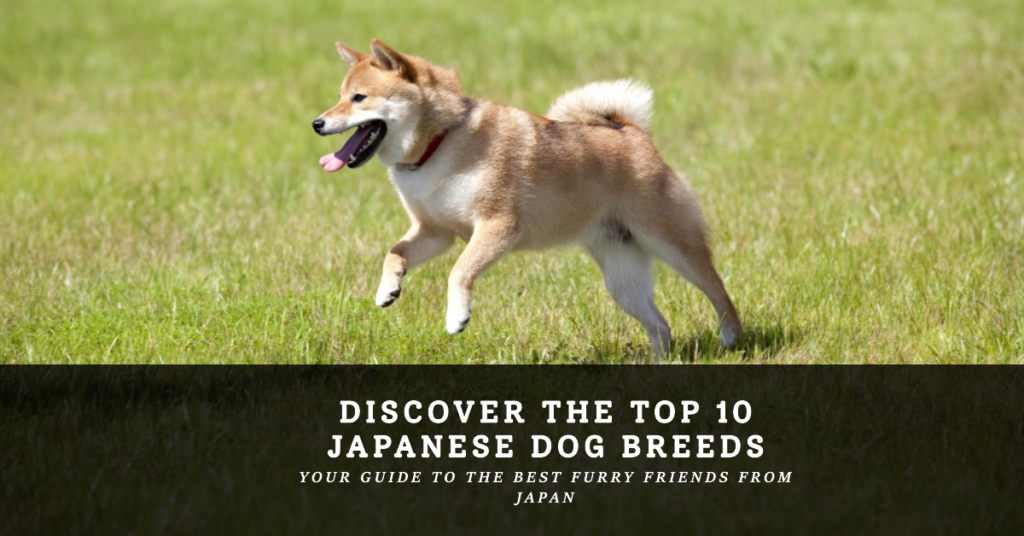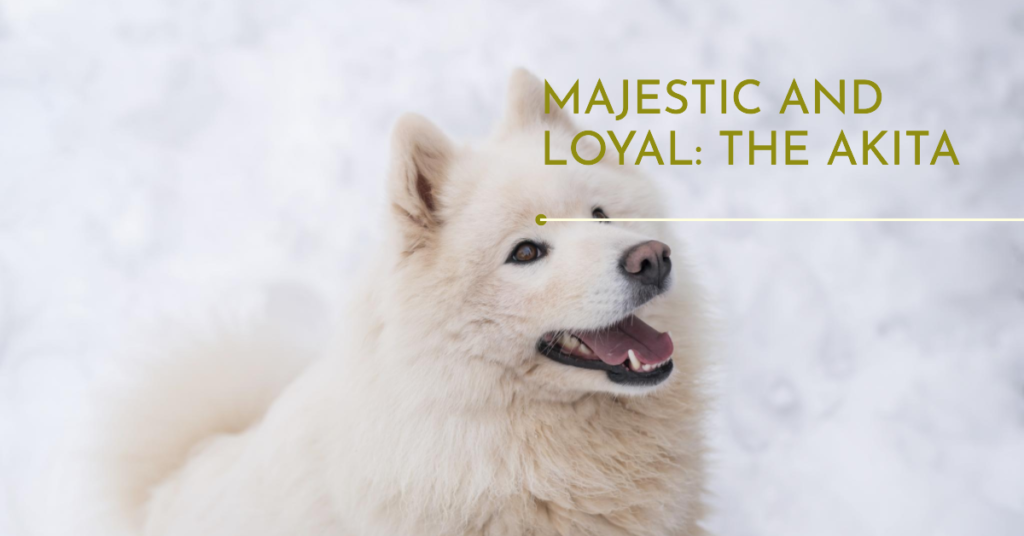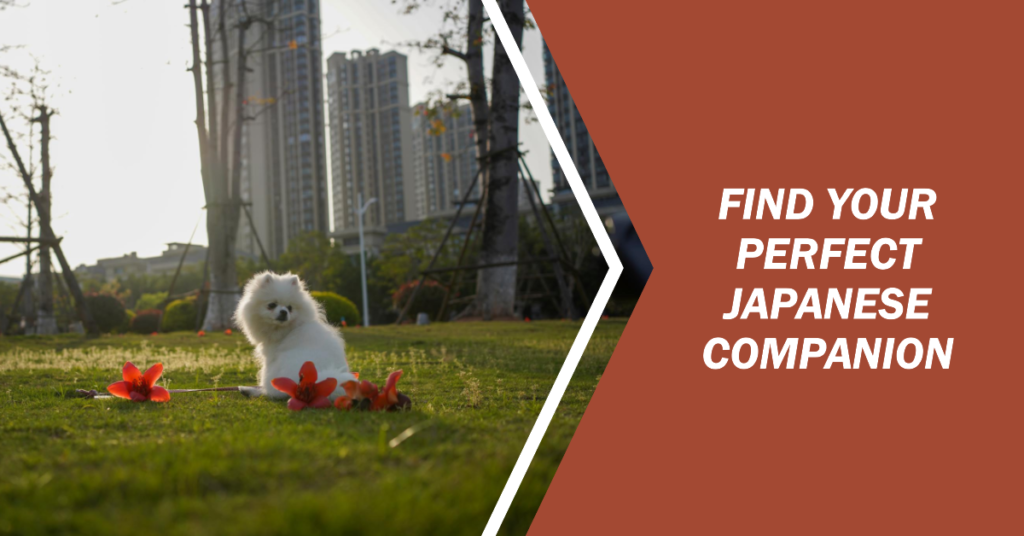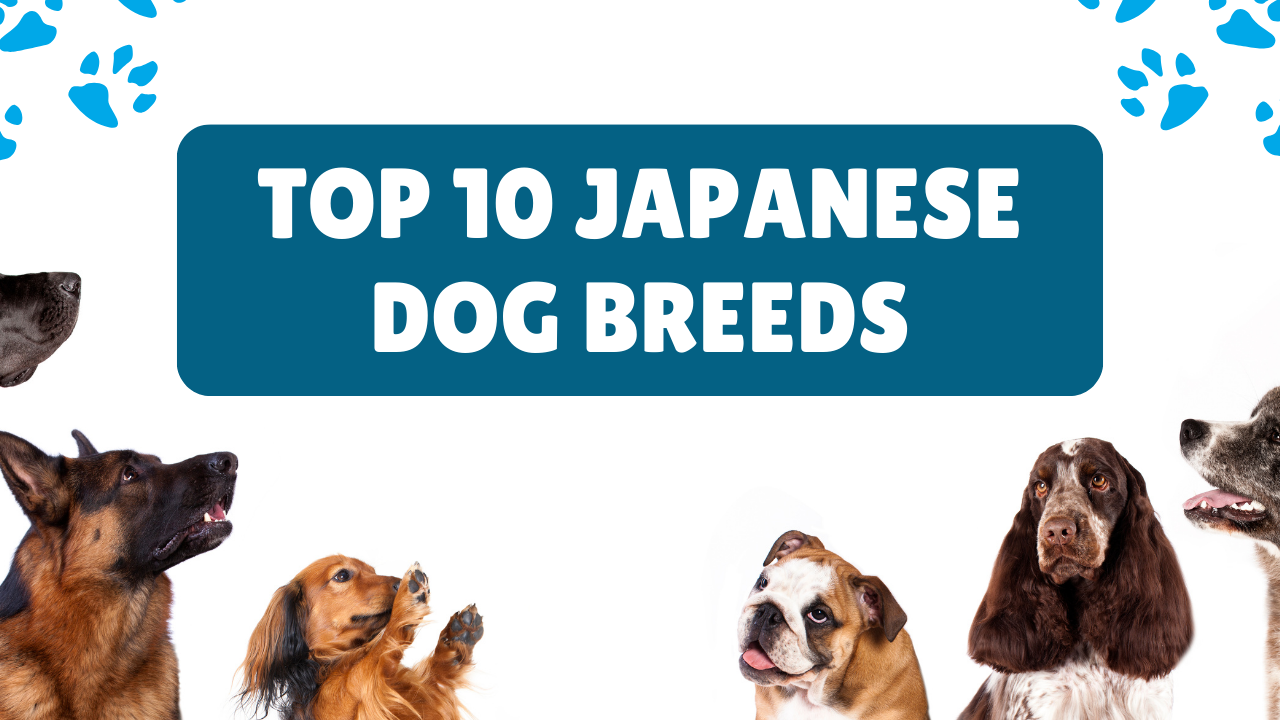Introduction
Choosing the right dog breed is a decision that can shape the bond you share with your furry friend. 🐶 In this guide, we’ll delve into the enchanting world of Japanese dog breeds, exploring their historical significance, unique traits, and the joy they bring into our lives.
Japanese Dog Breeds Overview And List
| Japanese Dog Breed | Category |
|---|---|
| Shiba Inu | Spirited Companion |
| Akita | Majestic Guardian |
| Japanese Spitz | Fluffy Elegance |
| Shikoku | Hunter’s Ally |
| Kishu Ken | Silent Guardian |
| Hokkaido Inu | Enduring Brave |
| Japanese Chin | The Aristocrat |
| Tosa Inu | Powerful Heritage |
| Japanese Terrier | Charming Rarity |
| Kai Ken | Spirited Tiger Dog |
Historical Significance 🏯 Japan’s rich history is intertwined with the presence of remarkable canine companions. From ancient times to modern days, Japanese dog breeds have played pivotal roles in the country’s culture and daily life.
Cultural Influence 🎎 The influence of Japanese dog breeds extends beyond their practical uses. These dogs hold a special place in the hearts of the Japanese people, symbolizing loyalty, courage, and companionship.
Unique Traits and Characteristics 🌟 Each Japanese dog breed possesses distinctive traits that set them apart. From spirited Shiba Inus to majestic Akitas, these breeds offer a diverse range of personalities and physical attributes.
You May Also Like:
| Article Title | Link |
|---|---|
| Best Dog Breeds in India Under 5000 Rupees | Read Article |
| The Best Dog Breeds in India 2024 | Read Article |
| Why Shih Tzu Are the Worst Dog | Read Article |

Shiba Inu: The Spirited Inu
Origin and History 🏡 The Shiba Inu, with its fox-like appearance, has a history dating back to ancient Japan. These spirited dogs were originally bred for hunting in the mountainous regions.
Physical Characteristics 🐕 Shibas are known for their compact, muscular build and a curled tail that adds to their charm. Their expressive eyes and distinctive coat colors make them instantly recognizable.
Temperament and Personality 😊 Shiba Inus are independent and bold, often displaying a spirited nature. While they can be a bit aloof, their loyalty to their family is unwavering.
Training Tips for Shiba Inus 🎓 Training a Shiba Inu requires patience and consistency. Positive reinforcement techniques work wonders, and early socialization is crucial for a well-adjusted pet.
Akita: Majestic and Loyal

Historical Background 🏰 Akitas have a regal history, once serving as imperial guards in Japan. Their dignified presence and loyalty make them a symbol of strength and nobility.
Distinctive Features 🐾 With a robust build and a curled tail, Akitas exude power and grace. Their thick double coat provides insulation, making them well-suited to colder climates.
Temperament and Behavior 😇 Akitas are known for their loyalty to their families. Despite their imposing appearance, they can be gentle giants, forming strong bonds with their human companions.
Akita’s Role as a Family Guardian 🏡 Akitas take their role as family protectors seriously. Proper socialization and training from an early age help channel their protective instincts in a positive way.
Hachiko: The Legendary Akita
Hachiko’s Story 📖 The tale of Hachiko, the faithful Akita who waited for his owner at a Tokyo train station, has become a symbol of loyalty worldwide. His story significantly contributed to the popularity of the Akita breed.
Impact on Akita Breed Popularity 🌐 Hachiko’s unwavering loyalty touched hearts globally, leading to increased interest in the Akita breed. Today, many families are drawn to these majestic dogs due to their captivating history.
Modern-Day Akita Traits 🏠 While Akitas retain their noble qualities, modern breeders focus on ensuring their adaptability as family pets. A well-trained Akita can be a loving and devoted companion.
Japanese Spitz: Fluffy Elegance
Breed Origins 🏞️ The Japanese Spitz, with its cloud-like white coat, originated from various Spitz breeds in Japan. Their appearance resembles a small, fluffy snowball.
Physical Appearance ❄️ Japanese Spitz dogs are characterized by their pure white double coat, pointed ears, and a plume-like tail. Their radiant, expressive eyes add to their overall charm.
Social Behavior 😺 Known for their friendly and sociable nature, Japanese Spitz dogs thrive on human interaction. They make excellent family pets and get along well with children and other animals.
Grooming Essentials ✂️ Maintaining the pristine appearance of the Japanese Spitz requires regular grooming. Their luxurious coat needs brushing to prevent matting and tangling.
Bold the Heading of the Second Table using Markdown language
Shikoku: The Hunter’s Ally
Historical Roots 🌲 Originating from the mountainous Shikoku region, these dogs were traditionally used for hunting and tracking. Their agility and keen senses make them excellent companions for outdoor enthusiasts.
Shikoku’s Hunting Background 🏞️ Bred for hunting wild boar and deer, Shikokus possess a strong prey drive. Proper training is essential to ensure they channel their instincts appropriately.
Shikoku’s Adaptability as a Pet 🏡 Despite their hunting background, Shikoku dogs can adapt well to family life. Early socialization and positive reinforcement help them become well-mannered companions.
Exercise and Mental Stimulation for Shikoku 🏋️♂️ Keeping a Shikoku mentally and physically engaged is crucial. Regular exercise, challenging games, and puzzle toys contribute to a happy and well-balanced Shikoku.
Kishu Ken: The Silent Guardian
Traditional Role in Japan 🏯 Kishu Kens have a rich history as silent hunters and guardians in the mountainous regions of Japan. Their reserved nature makes them excellent watchdogs.
Appearance and Size 📏 With a well-muscled physique, erect ears, and a curled tail, Kishu Kens have a distinct appearance. Their white coat, symbolizing purity, adds to their elegance.
Kishu Ken’s Reserved Nature 🤫 While Kishu Kens are reserved around strangers, they form deep bonds with their family. Early socialization is essential to ensure they remain well-behaved in various situations.
Tips for Training a Kishu Ken 🎓 Training a Kishu Ken requires a calm and consistent approach. Positive reinforcement and rewards for good behavior help build trust and cooperation.
Hokkaido Inu: Enduring and Brave
Native to Hokkaido Island 🏝️ Hailing from the northernmost island of Hokkaido, these dogs were originally bred for hunting large game, including bears. Their sturdy build reflects their resilience.
Physical Characteristics 🦮 Hokkaido Inus have a dense double coat, erect triangular ears, and a curled tail. Their robust build and distinctive markings make them a visually striking breed.
Hokkaido Inu’s Relationship with Nature 🌿 Being close to nature is in the Hokkaido Inu’s DNA. They thrive in outdoor environments and enjoy activities that stimulate their natural instincts.
Meeting the Exercise Needs of Hokkaido Inu 🏞️ Providing ample opportunities for exercise, such as daily walks, hikes, and interactive play, is essential to keep a Hokkaido Inu physically and mentally satisfied.
Japanese Chin: The Aristocrat
Imperial Connection 🏰 Known as the Japanese Chin or Japanese Spaniel, this breed has a royal history, often favored by Japanese nobility and imperial courts for centuries.
Distinctive Appearance 🎭 Japanese Chins have a distinctive appearance with a pushed-in face, large expressive eyes, and a luxurious mane of fur around their neck. Their elegant, aristocratic demeanor is captivating.
Temperament and Socialization 😺 These charming dogs are known for their friendly and affectionate nature. Japanese Chins form strong bonds with their owners and enjoy being the center of attention.
Caring for the Japanese Chin’s Luxurious Coat 💇 Regular grooming is essential to maintain the Japanese Chin’s beautiful coat. Brushing, bathing, and occasional trims keep their fur in optimal condition.
Tosa Inu: A Powerful Heritage
Historical Background in Dog Fighting 🥊 The Tosa Inu has a history rooted in dog fighting in Japan, where they were bred for strength and courage. Despite their past, modern Tosa Inus can be gentle and loving companions.
Tosa Inu’s Gentle Side 😇 While Tosa Inus have a powerful presence, they are known for their gentle and affectionate nature with their families. Early socialization is crucial to ensure they are well-mannered.
Responsible Ownership of Tosa Inu 🏡 Owning a Tosa Inu comes with a responsibility to provide a loving and structured environment. Proper training and socialization are essential to foster a well-behaved pet.
Exercise and Mental Stimulation for Tosa Inu 🧠 Tosa Inus benefit from regular exercise to maintain their physical health and mental well-being. Engaging activities and interactive toys contribute to their overall happiness.
Japanese Terrier: A Charming Rarity
Lesser-Known Breed 🕵️ The Japanese Terrier is a hidden gem among Japanese dog breeds, known for its compact size and friendly disposition. This rare breed is gaining recognition for its charming qualities.
Physical Traits and Size 📏 With a small, muscular build and distinctive coat patterns, Japanese Terriers are visually appealing. Their expressive eyes and perky ears add to their overall charm.
Japanese Terrier’s Sociable Nature 🥳 Despite their terrier roots, these dogs are sociable and enjoy the company of their human family members. They thrive in environments where they receive attention and affection.
Training and Playtime Recommendations 🎾 Interactive play and positive reinforcement training methods work well with Japanese Terriers. Their intelligence and eagerness to please make them quick learners.
Chinook: Japanese-American Heritage
Cross-Cultural Origins 🌏 The Chinook, although not originally from Japan, has a unique connection to Japanese-American heritage. This rare breed is a cross between European and Japanese dogs, creating a distinct lineage.
Chinook’s Appearance and Size 📏 Chinooks are known for their strength, endurance, and a distinctive coat that ranges from tawny to reddish-brown. Their expressive eyes convey intelligence and warmth.
Adaptability as a Family Pet 🏡 Chinooks make excellent family pets, displaying a friendly and gentle nature. They thrive in environments where they receive love and attention from their human companions.
Health Considerations for Chinook 🩺 Regular veterinary check-ups and a balanced diet are essential for the well-being of Chinooks. Being aware of breed-specific health considerations ensures a happy and healthy pet.
Kai Ken: The Spirited Tiger Dog
Uniqueness in Appearance 🐅 Known as the “Tiger Dog” in Japan, the Kai Ken boasts a distinctive brindle coat pattern reminiscent of a tiger’s stripes. Their unique appearance sets them apart from other Japanese breeds.
Kai Ken’s Intelligence and Trainability 🧠 Kai Kens are intelligent and trainable, making them suitable for various activities. Positive reinforcement and consistent training help harness their natural abilities.
Kai Ken as a Family Companion 🏡 While Kai Kens have a strong hunting instinct, they can also be affectionate family companions. Providing mental stimulation and engaging activities ensures a happy Kai Ken.
Providing Mental Stimulation for Kai Ken 🤖 Enriching a Kai Ken’s environment with puzzle toys, interactive games, and regular exercise contributes to their mental well-being. These spirited dogs thrive on engaging activities.
Japanese Tosa: A Regal Presence
Historical Significance in Japan 🏛️ The Japanese Tosa, often referred to as the Tosa Inu, has a storied history in Japan. Bred for strength and endurance, they were used in dog fighting and later evolved into gentle family companions.
Tosa’s Appearance and Size 📏 With a muscular build, a broad head, and a short coat, Tosa Inus exude strength and power. Despite their imposing appearance, they are known for their gentle demeanor.
Temperament and Sociability 😇 Tosas form strong bonds with their families and are generally good with children. Early socialization helps them develop into well-mannered and sociable companions.
Meeting the Exercise Needs of Tosa 🏋️♂️ Regular exercise is essential for Tosa Inus to maintain their physical health and mental well-being. Outdoor activities and interactive play contribute to a happy and content Tosa.
Choosing the Right Japanese Dog Breed for You

Lifestyle Considerations 🏠 When choosing a Japanese dog breed, consider your lifestyle. Some breeds are more energetic and require ample exercise, while others may thrive in a quieter environment.
Size and Space Requirements 📏 The size of your living space matters. Larger breeds like Akitas and Tosas may require more room, while smaller breeds like Japanese Terriers adapt well to apartment living.
Allergies and Health Considerations 🤧 Be mindful of potential allergies when selecting a breed. Some breeds shed more than others, and understanding the health considerations specific to each breed is crucial.
Matching Personality Traits 😊 Consider your own personality and preferences when choosing a dog. Some breeds are more independent, while others thrive on constant companionship. Finding a match ensures a harmonious relationship.
Caring for Japanese Dog Breeds
Nutrition and Diet Guidelines 🍖 Providing a balanced and nutritious diet is essential for the well-being of Japanese dog breeds. Consult with your veterinarian to determine the best dietary plan for your specific breed.
Grooming and Maintenance Tips ✂️ Regular grooming keeps your Japanese dog’s coat healthy and free of mats. Different breeds have varying grooming needs, so tailor your grooming routine to suit your dog’s requirements.
Veterinary Care and Regular Checkups 🩺 Regular veterinary check-ups are crucial for early detection of potential health issues. Stay up-to-date on vaccinations and follow your vet’s recommendations for preventive care.
Exercise and Mental Stimulation Requirements 🏋️♂️ Japanese dog breeds, known for their intelligence and energy, require regular exercise and mental stimulation. Engage in activities that challenge their minds and keep them physically active.
Training Techniques for Japanese Dog Breeds
Positive Reinforcement Methods 🌟 Utilize positive reinforcement techniques such as treats, praise, and play to encourage good behavior. Japanese dog breeds respond well to positive interactions and rewards.
Socialization Strategies 👫 Early socialization is key to ensuring your Japanese dog is well-behaved in various situations. Expose them to different environments, people,
and other animals from a young age. This helps them develop into confident and well-adjusted companions.
Addressing Breed-Specific Challenges 🐕 Each Japanese dog breed comes with its own set of characteristics and challenges. Understanding these breed-specific traits is crucial for effective training. For example, Shiba Inus may have a stubborn streak, while Akitas might require consistent leadership.
Obedience Training Tips 🎓 Obedience training establishes a strong bond between you and your Japanese dog. Consistency, patience, and positive reinforcement are key elements in fostering good behavior. Rewarding desired actions encourages a positive learning experience.
Common Health Issues in Japanese Dog Breeds
Genetic Predispositions 🧬 Like all breeds, Japanese dogs may have specific genetic predispositions. Stay informed about potential health concerns related to your chosen breed, and work closely with your veterinarian to address any issues.
Preventive Measures 🏥 Preventive healthcare is vital for ensuring the longevity and well-being of your Japanese dog. Regular check-ups, vaccinations, and a healthy lifestyle contribute to a happy and thriving companion.
Recognizing Signs of Illness 🤒 Understanding your dog’s normal behavior is essential for early detection of illness. Keep an eye out for changes in eating habits, energy levels, or any signs of discomfort. Prompt veterinary attention can make a significant difference.
Seeking Veterinary Assistance 🚑 If you notice any concerning symptoms or behaviors, don’t hesitate to consult your veterinarian. Timely professional care can address issues before they escalate, ensuring a healthier and happier life for your furry friend.
The Role of Japanese Dog Breeds in Modern Society
Companionship and Emotional Support 🤗 Japanese dog breeds have transcended their historical roles and become cherished companions. Their loyalty and affection provide emotional support and enhance the overall well-being of their owners.
Therapy and Assistance Dogs 🐾 Some Japanese dog breeds excel as therapy and assistance dogs. Their calm demeanor and ability to form strong bonds make them ideal partners for individuals with various needs, contributing positively to mental health.
Cultural Significance in Contemporary Japan 🎌 In modern Japan, certain breeds hold cultural significance and are symbols of national pride. Their presence in daily life, media, and even celebrations underscores the enduring connection between the Japanese people and their beloved dogs.
Global Popularity of Japanese Dog Breeds 🌐 Beyond Japan, these captivating breeds have gained international popularity. Their unique characteristics, loyalty, and versatility have made them sought-after pets, enriching households around the world.
Best Dog Food On Amazon
FAQs About Japanese Dog Breeds
1. Are Japanese dog breeds suitable for families with children?
Absolutely! Many Japanese dog breeds, such as Shiba Inus and Akitas, can be wonderful family companions when raised with proper socialization and training.
2. Do Japanese dogs require a lot of grooming?
The grooming needs vary among breeds. While some, like the Japanese Chin, require regular grooming, others, such as the Shiba Inu, have minimal grooming requirements.
3. Are Japanese dog breeds good for apartment living?
Yes, some Japanese breeds, like the Japanese Terrier, adapt well to apartment living due to their smaller size and moderate exercise needs.
4. How can I ensure the health of my Japanese dog?
Regular veterinary check-ups, a balanced diet, and preventive care are essential for maintaining the health of your Japanese dog. Stay informed about breed-specific health considerations.
5. What makes Japanese dog breeds unique compared to other breeds?
Japanese dog breeds are known for their distinct appearance, loyal nature, and cultural significance. Each breed has its own set of characteristics that make them stand out in the canine world.
Conclusion
In this guide, we’ve journeyed through the diverse world of Japanese dog breeds, from the spirited Shiba Inu to the regal Tosa Inu. Each breed brings its own charm and unique qualities, making the choice of a canine companion a delightful adventure.
Selecting a Japanese dog breed involves a thoughtful consideration of lifestyle, space, and personal preferences. Whether you’re drawn to the elegance of the Japanese Chin or the strength of the Akita, the perfect furry friend awaits, ready to become an integral part of your life.
Owning a dog is a commitment that goes beyond the initial excitement. Responsible ownership involves providing love, proper care, and a nurturing environment. The bond you create with your Japanese dog will be a source of joy and companionship for years to come.



